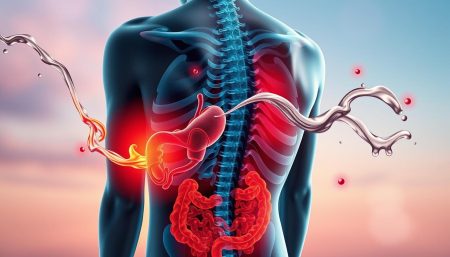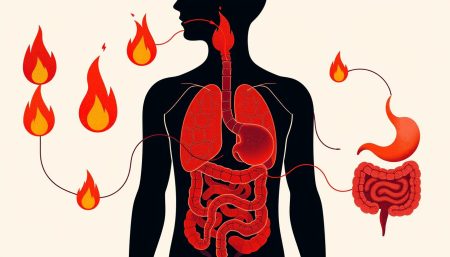Many people struggle with acid reflux, but there’s a way to find relief without medication. Natural methods can help prevent heartburn right at home. This article will guide you through evidence-based lifestyle changes and holistic remedies.
By making these changes, you can reduce heartburn and lower the risk of GERD (Gastroesophageal Reflux Disease). It’s all about empowering yourself to manage acid reflux naturally.
Understanding Acid Reflux and Its Symptoms
Key Takeaways
- Adopting natural strategies for acid reflux can help manage symptoms without immediate pharmaceutical intervention.
- Preventing heartburn naturally requires a combination of dietary changes, lifestyle adjustments, and stress management.
- Understanding the triggers and effects of acid reflux is the first step towards long-term relief and prevention.
- Integrating natural and behavioral remedies can offer substantial improvement in quality of life for sufferers.
- Education about acid reflux and its natural management is crucial for those seeking alternatives to medication.
Understanding Acid Reflux and Its Symptoms
Acid reflux happens when stomach acid flows back into the esophagus. This can cause discomfort and other problems. Knowing what causes heartburn is key to managing and preventing it. We’ll look at the common symptoms, how it works, and why it’s important to recognize them.
Understanding GERD means knowing about chronic acid reflux symptoms. These can lead to serious health issues if not treated. Both acid reflux and GERD share symptoms but vary in how often and how severe they are. It’s important to spot and treat them early.
- Burning sensation in the chest (heartburn), often after eating, which might be worse at night
- Chest pain
- Difficulty swallowing
- Regurgitation of food or sour liquid
- Sensation of a lump in the throat
Spotting these symptoms is the first step in managing acid reflux and GERD. This knowledge helps people make better health choices and find the right treatments.
| Condition | Frequency of Symptoms | Potential Complications |
|---|---|---|
| Acid Reflux | Occasional, often triggered by diet or stress | Esophagitis, Barrett’s Esophagus |
| GERD | Frequent, persistent, not solely diet-related | Stricture, Esophageal Cancer |
Both acid reflux and GERD need attention to avoid serious health problems. Knowing the differences helps manage symptoms better and prevent severe disease. By understanding what triggers symptoms, people can adjust their treatment plans.
How to Prevent Acid Reflux
To prevent acid reflux, you need to know what triggers it and make smart lifestyle changes. Understanding these can help lessen symptoms and make life better.
Identifying Acid Reflux Triggers
Finding out what foods and habits make acid reflux worse is key. A food diary can help a lot. It shows which foods cause problems.
- Caffeinated beverages
- Spicy foods
- High-fat meals
- Acidic fruits and juices
- Chocolate and mint
Knowing what triggers acid reflux helps you manage it better.
Importance of a Balanced Diet
Eating a balanced acid reflux diet is crucial. It helps ease symptoms and keeps your digestive system healthy. This diet includes foods that help neutralize stomach acid and protect your esophagus.
| Food Group | Recommended Foods | Foods to Avoid |
|---|---|---|
| Fruits and Vegetables | Bananas, melons, carrots, and kale | Tomatoes, onions, and citrus fruits |
| Proteins | Lean meats, fish, eggs, and tofu | Fatty cuts of beef, pork, and fried meats |
| Dairy | Low-fat milk, yogurt, and cheese | High-fat dairy products |
| Grains | Oats, brown rice, and whole-grain bread | Refined grains and heavily processed foods |
A balanced acid reflux diet avoids triggers and includes soothing foods. Adding lifestyle changes like managing weight and not eating late can also help a lot. These steps can greatly reduce symptoms and improve health.
Natural Remedies for Acid Reflux Relief
Looking into natural remedies for acid reflux is key to managing symptoms without drugs. Home treatments for GERD can cut down on medication use and boost digestive health.
Herbal supplements and lifestyle changes are top picks for heartburn relief. They help keep the digestive system in balance. Organic ingredients and herbs have long been valued for their health benefits, especially in easing stomach issues.

Changing what you eat is also vital for acid reflux control. Adding alkaline foods like bananas and leafy greens can help neutralize stomach acid. On the other hand, cutting down on acidic and spicy foods can lessen heartburn.
- Aloe Vera Juice: Known for its soothing properties, aloe vera can calm the stomach lining and reduce acid buildup.
- Ginger Tea: A natural anti-inflammatory, ginger can help alleviate inflammation in the esophagus and help with efficient digestion.
- Apple Cider Vinegar: Though acidic, it can actually help to balance stomach acid and aid in digestion.
Changing your lifestyle is also crucial. Keeping a healthy weight, avoiding lying down after eating, and sleeping with your head raised can help reduce acid reflux symptoms.
| Remedy | Benefits | Usage Tips |
|---|---|---|
| Chamomile Tea | Reduces stomach inflammation and neutralizes acid levels. | Drink 1-2 cups daily after meals. |
| High-Fiber Foods | Enhances digestion and limits acid production. | Incorporate whole grains and legumes into meals. |
| Almond Milk | Alkaline nature helps balance gastric acidity. | Use as a milk substitute in diet. |
Using these home treatments for GERD can greatly reduce heartburn. Tailoring these methods to fit your health needs and preferences can lead to better results and improved digestive health.
Acid Reflux Diet: Foods to Eat and Avoid
Creating an effective acid reflux diet is key to managing symptoms and improving digestion. Knowing which foods to eat and which to avoid can greatly help those looking for heartburn relief.
Foods That Fight Acid Reflux
- Fibrous foods like oatmeal, bananas, and root vegetables help absorb stomach acid and ease digestion.
- Lean meats such as chicken, turkey, and fish are high in protein and low in fat. This combo can help reduce symptoms.
- Almonds and other nuts are great snacks that can balance pH levels in the stomach.
Common Culprits: What to Limit or Eliminate
Avoiding acid reflux means staying away from foods and drinks that can trigger symptoms. Here’s what to limit:
| Food Type | Examples | Reason for Avoidance |
|---|---|---|
| High-fat Foods | Fried foods, creamy sauces | They relax the lower esophageal sphincter, allowing acid to escape. |
| Acidic Foods | Tomatoes, citrus fruits | Can irritate the esophagus and trigger flare-ups. |
| Caffeinated Beverages | Coffee, tea | May increase stomach acid production. |
Following dietary changes and avoiding acid reflux by choosing the right foods can greatly improve your life quality.
Lifestyle Changes for Managing Acid Reflux
Making lifestyle modifications for acid reflux can greatly improve your life and lessen symptoms. This part talks about simple, everyday changes to help you stay healthy and avoid GERD.
- Weight Management: Excess weight can put more pressure on your stomach, making acid reflux worse. Eating right and exercising regularly can help manage your weight and ease symptoms.
- Mindful Eating Habits: Eating smaller meals more often can stop your stomach from getting too full. This reduces pressure on the lower esophageal sphincter (LES).
- Optimize Sleeping Position: Raising the head of your bed by 6-8 inches can stop stomach acid from rising while you sleep. Don’t lie down right after eating to let your body digest.
- Wardrobe Choices: Tight clothes can squeeze your stomach, pushing acid up into your esophagus. Wearing looser clothes can ease this pressure.
Following these tips can help manage symptoms and improve your digestive health. By sticking to these lifestyle modifications for acid reflux, you can see a big difference in your condition. You might need to make these changes for a while, but the long-term benefits are worth it.
These healthy habits to prevent GERD can make a big difference in your well-being and quality of life. Adding these changes to your daily routine can lead to significant improvements in your health and happiness.
The Role of Stress in Acid Reflux
Stress and digestive health are closely linked, especially with acid reflux. Stress can make existing digestive problems worse and even start new ones. Knowing this helps people manage their symptoms better by reducing stress and improving mental health.
Stress Management Techniques
- Deep breathing exercises
- Progressive muscle relaxation
- Regular physical activity
- Mindfulness meditation
- Adequate sleep and relaxation
These methods help manage stress and acid reflux. They also improve overall health and well-being.
Connecting Mental Health and Digestive Health
Mental health and digestion are closely connected. Stress can cause many digestive issues, including acid reflux. By taking care of mental health, people can reduce acid reflux symptoms.

Supporting stress management and mental health care leads to a healthier digestive system. It also helps achieve a more balanced life.
Heartburn Relief: Quick Tips and Long-Term Strategies
For quick heartburn relief, you can find help in your kitchen or at the pharmacy. But to really manage acid reflux, you need to focus on long-term prevention. This section will cover quick fixes and lasting solutions to keep acid reflux at bay.
- Baking soda mix: A teaspoon in water can quickly neutralize stomach acid, giving you relief.
- Ginger tea: Its soothing effects on the stomach can help ease the burn.
- Over-the-counter antacids: They work fast but shouldn’t be your only solution for managing acid reflux.
While these quick fixes work, they don’t solve the root cause of acid reflux. Here are some long-term strategies to manage and prevent acid reflux:
| Strategy | Benefit |
|---|---|
| Maintain a balanced diet | Helps avoid trigger foods and reduce acid reflux. |
| Weight management | Less pressure on your stomach means less acid and bile moving up. |
| Regular exercise | Boosts health and helps keep your weight in check. |
By adopting these long-term strategies for acid reflux prevention, you can lessen heartburn’s impact. It’s also wise to consult a healthcare expert for personalized advice to manage your acid reflux better.
Acid Reflux Treatment: Integrating Natural and Medical Approaches
Using both natural remedies and medical treatments can help manage acid reflux. This mix allows for a treatment plan that fits you better. Knowing when to use over-the-counter meds and when to get prescription treatments is key for lasting relief.
Understanding Over-the-Counter Medications
For occasional acid reflux, over-the-counter meds are a good start. These include antacids, H2 blockers, and PPIs. They help reduce stomach acid and offer quick relief. But, it’s important to use them wisely and only when needed.
- Antacids neutralize stomach acid and can relieve mild symptoms.
- H2 blockers decrease acid production.
- Proton pump inhibitors block acid production, allowing the esophagus to heal.
When to Consider Prescription Medications
If acid reflux is a regular problem or you have GERD, you might need prescription meds. These are stronger versions of the over-the-counter meds. Always talk to a doctor to get the right treatment for you.
- Prescription H2 blockers for persistent symptoms.
- Higher-dose PPIs, often combined with lifestyle adjustments.
- Alginate therapy, which forms a barrier in the stomach to prevent reflux.
Choosing between over-the-counter or prescription meds is important. Always watch how your symptoms change with treatment. Adding healthy lifestyle choices and stress management can greatly improve your life and prevent future problems.
GERD Prevention: When Acid Reflux Is More Serious
It’s important to know the risks of chronic acid reflux and take steps to prevent GERD. GERD is a more serious form of acid reflux. If not managed, it can cause serious heartburn problems.

Managing chronic acid reflux means making lifestyle changes and using medical treatments. These steps can lower the risk of getting GERD. Here are some key prevention tips:
- Dietary Changes: Stay away from foods that trigger acid reflux. Eat smaller meals and add alkaline foods to your diet.
- Weight Management: Keeping a healthy weight helps reduce stomach pressure. This lowers the chance of acid leaking up.
- Elevating the Head During Sleep: Use bed wedges or raise your bed head to stop acid reflux at night.
- Avoid Smoking and Limit Alcohol: Both can weaken the esophageal sphincter and make acid reflux worse.
- Regular Exercise: Being active is good for digestion. But, choose low-impact exercises to avoid making symptoms worse.
If you have frequent and severe acid reflux, talk to a healthcare provider. They can help manage your condition. Early treatment can stop GERD and avoid serious heartburn damage like esophageal damage.
Watching your symptoms closely and taking action is key to preventing GERD. By following these steps, you can lessen the effects of acid reflux. This helps keep your digestive system healthy.
Staying Hydrated: Water’s Impact on Acid Reflux
It’s important to know how hydration and acid reflux are connected. Drinking enough water can help with digestion and reduce acid reflux symptoms. This section will show how staying hydrated can help with stomach issues and suggest the best drinks for GERD.
The Benefits of Proper Hydration
Drinking enough water is good for many body functions, including digestion. It helps make saliva, which can neutralize stomach acid and protect the esophagus. Drinking enough water can also make stomach acid less acidic and less likely to cause reflux.
Best Drinks for Acid Reflux Sufferers
Some drinks can make GERD symptoms better, while others can make them worse. Here are some drinks that are good for GERD:
- Water: It’s neutral and doesn’t change the stomach’s acidity.
- Herbal teas: Ginger and chamomile teas can calm the stomach.
- Coconut water: It’s hydrating and has natural electrolytes.
- Plant-based milks: Almond milk and other non-acidic milks are gentle on the stomach.
But it’s not just about what you drink. How much and when you drink matters too. Drinking too much, especially with meals, can put pressure on the stomach and increase reflux risk. Drinking water between meals can help digestion without upsetting your stomach.
| Drink | Benefits | Notes |
|---|---|---|
| Water | Hydrates, dilutes stomach acid | Consume regularly throughout the day |
| Ginger tea | Anti-inflammatory, aids digestion | Limit to 2-3 cups daily to avoid possible irritation |
| Almond milk | Low in acid, high in calcium | A smooth alternative to dairy |
Exercises and Acid Reflux: Finding the Right Balance
Finding the right balance between exercising with acid reflux and staying healthy is tough. To manage symptoms and stay active, choose safe workouts for GERD. Walking, yoga, and swimming are good choices that help digestion.
It’s important to know how different exercises affect acid reflux. High-impact exercises can put extra pressure on your stomach, causing discomfort. So, it’s best to exercise lightly and avoid hard workouts after eating.
Engaging in mindful physical activity and digestion management strategies ensures that you not only keep active but also protect your esophageal health.
For more detailed advice and workout tips for GERD patients, check out these expert recommendations.
| Activity Type | Impact on Acid Reflux | Recommendations |
|---|---|---|
| High-impact Aerobics | Potential Increase in Symptoms | Limit and modify |
| Weightlifting | Can Increase Abdominal Pressure | Avoid heavy weights/post-meal sessions |
| Low-impact Exercises | Helps in Symptom Management | Ideal for regular activity |
Listening to your body’s signals during and after exercise is key. If certain activities make your symptoms worse, it’s time to change your routine. Talking to a healthcare provider can help you find exercises that fit your health and fitness goals.
Remember, every individual’s experience with acid reflux is unique, and adapting your exercise routine can make a substantial difference in your quality of life.
Conclusion
We’ve looked at many ways to manage acid reflux. It’s important to mix science with care. By finding what triggers it, changing our diet, and using natural remedies, we can help our digestive system. It’s a long-term effort to live a healthier life.
Being careful with what we eat and managing stress helps fight acid reflux. Drinking plenty of water, eating mindfully, and exercising also help. It’s key to remember to get medical help if symptoms don’t go away. Using natural methods with doctor’s advice is the best way to stay healthy.
This article has given you tools to improve your health. Living a healthier life not only helps with acid reflux but makes you feel better overall. We want to help you take charge of your health. Use what you’ve learned to make informed choices and improve your well-being.
FAQ
Q: How can I prevent acid reflux naturally?
A: To prevent acid reflux naturally, start by making lifestyle changes. Keep a healthy weight and avoid overeating. Also, reduce stress and cut out foods that trigger acid reflux.
Try natural remedies like ginger, aloe vera, or slippery elm. Focus on eating foods that are good for acid reflux.
Q: What are the common symptoms of acid reflux?
A: Acid reflux symptoms include a burning chest feeling (heartburn) and bringing up food or sour liquid. You might also have trouble swallowing, a chronic cough, laryngitis, and sleep problems.
Q: What dietary changes can help manage acid reflux?
A: Eat a balanced diet with alkaline foods like veggies and non-citrus fruits. Include whole grains, lean proteins, and healthy fats. Avoid spicy, fatty, chocolate, caffeine, onions, tomato sauce, and carbonated drinks.
Q: Are there any natural remedies for acid reflux that provide relief?
A: Yes, natural remedies like herbal teas, alkaline water, apple cider vinegar, and baking soda can help. But try them carefully and talk to a doctor if you have concerns.
Q: What lifestyle changes can minimize acid reflux symptoms?
A: To lessen acid reflux symptoms, eat smaller meals and don’t eat before bed. Elevate your bed’s head, wear loose clothes, quit smoking, and drink less alcohol. These changes can help a lot.
Q: Can stress cause acid reflux to worsen, and how can it be managed?
A: Yes, stress can make acid reflux worse by increasing stomach acid and muscle tension. Use mindfulness, deep breathing, yoga, and rest to manage stress and reduce its effect on acid reflux.
Q: What quick tips can provide immediate relief from heartburn?
A: For quick heartburn relief, stand up straight and drink water to wash acid down. Chewing gum can also help by increasing saliva. Remember, these are temporary fixes and not a replacement for medical advice.
Q: How do over-the-counter (OTC) and prescription medications play a role in acid reflux treatment?
A: OTC meds like antacids, H2 blockers, and PPIs can help by neutralizing or reducing acid. Prescription meds might be needed for chronic or severe cases to manage symptoms long-term.
Q: When should someone with acid reflux symptoms seek medical attention?
A: Seek medical help if symptoms are severe, last a long time, or come with weight loss, trouble swallowing, vomiting blood, or black stools. Regular doctor visits are key to managing acid reflux.
Q: How does hydration affect acid reflux, and what are the best drinks to consume?
A: Drinking enough water can dilute stomach acid and clear the esophagus. Good drinks for acid reflux include water, herbal teas, and non-citrus juices. Avoid caffeinated, carbonated, and alcoholic drinks as they can trigger symptoms.
Q: What exercises are safe for those with acid reflux, and how can physical activity impact symptoms?
A: Safe exercises for acid reflux include walking, cycling, and yoga. These can help digestion and weight management, reducing symptoms. But high-impact activities might worsen symptoms for some, so listen to your body.


















